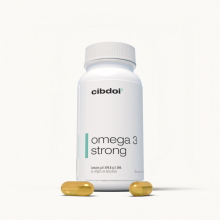Which Omega-3 is Best for Heart Health?
Published:
Omega-3 fatty acids provide a multitude of benefits for your cardiovascular system. They help lower blood pressure, reduce inflammation, decrease triglycerides, and prevent plaque buildup in arteries.
Contents:
With heart disease being the leading cause of death worldwide, optimizing omega-3 intake is a smart way to protect your heart. But when it comes to supplements, which type of omega-3 is best?
Below is an in-depth look at the evidence on EPA, DHA and ALA omega-3s for supporting heart health.

An Overview of Omega-3 Fatty Acids
Omega-3s are a class of polyunsaturated fats with unique health benefits. There are three main types that each play different roles:
- Eicosapentaenoic acid (EPA): Potent anti-inflammatory and blood thinning effects. Mainly found in seafood.
- Docosahexaenoic acid (DHA): Vital for brain function. Also mainly obtained from fatty fish.
- Alpha-linolenic acid (ALA): Found in plant oils and converts minimally to EPA/DHA.
In the body, omega-3s help form cell membranes, regulate genetic expression, and produce anti-inflammatorymessaging molecules called eicosanoids.
But modern diets are often too low in omega-3s. Supplements can help fill this nutrient gap and provide cardiovascular protection.
When shopping for an omega-3 supplement to support heart health, EPA and DHA are the most important to look for. Here’s why:
EPA Benefits for Heart Health
Multiple studies show EPA is the most beneficial omega-3 for heart health for the following reasons:
1. Lowers Triglycerides
Triglycerides are a type of fat found in your blood. High levels raise heart disease risk.
EPA is excellent for reducing elevated triglycerides. Doses of 1-2 grams per day can lower triglycerides by up to 30%.
In one study, EPA supplements cut triglycerides by 19% over 6 months. DHA did not provide the same benefit.
EPA’s effects on triglycerides happen through enhancing fat breakdown and slowing production of new triglyceride molecules in the liver.
2. Thins Blood to Prevent Clots
Blood clots can block arteries and cause heart attacks and strokes. EPA helps prevent them by reducing platelet stickiness.
Platelets are blood cells that form clots when they clump together. EPA lowers excessive platelet aggregation, making blood less likely to clot.
It also helps thin blood by slightly prolonging bleeding time. One study found EPA supplements increased bleeding time by almost one minute compared to placebo.
3. Stabilizes Heart Rhythms
Abnormal heartbeats can precipitate cardiac events. EPA helps regulate heart rhythms.
In particular, EPA raises levels of resolvins - compounds that exert protective effects on heart cells. This helps prevent erratic electrical signaling between muscle cells.
Multiple human studies demonstrate EPA significantly decreases dangerous arrhythmias and lowers heart rate. This provides protection against sudden cardiac death.
4. Improves Arterial Health
Plaque buildup in arteries reduces blood flow and raises heart attack risk. EPA helps reduce this process (atherosclerosis).
It lowers inflammation within arteries and fights oxidation of LDL cholesterol - two drivers of plaque formation.
In double blind trials, EPA slowed the progress of atherosclerosis, improved arterial function, and decreased inflammatory markers.
5. Lowers Blood Pressure
High blood pressure is a major risk factor for heart disease. EPA supplements have been shown to lower it, especially in people with hypertension.
In one analysis of 70 studies, EPA and DHA both reduced blood pressure. However, EPA provided greater effects on systolic blood pressure.
For supporting heart health, extensive research demonstrates EPA outperforms DHA for lowering triglycerides, preventing blood clots, stabilizing heart rhythm and improving arterial function.
DHA Benefits for Heart Health
While EPA has more direct cardiovascular benefits, the omega-3 DHA also provides heart health advantages:
1. Improves Blood Flow
DHA keeps blood vessels elastic, allowing for good blood flow and oxygen delivery to the heart.
In a 6-month study, DHA supplements increased flow-mediated dilation - the ability of arteries to properly expand. Impaired dilation is an early marker of cardiovascular issues.
DHA may also protect against formation of aneurysms by keeping artery walls flexible and less prone to damage.
2. Lowers Heart Rate and Blood Pressure
Like EPA, DHA has mild blood pressure lowering effects. It may also help keep heart rate in a healthy range.
In a trial of healthy men, just 4 weeks of DHA supplements (1.5 grams/day) significantly decreased resting heart rate by about 4 beats per minute compared to placebo.
This impact results from DHA’s role in smooth muscle cell function within heart tissue.
3. Guards Against Oxidative Damage
DHA is highly concentrated in heart muscle cells. This makes heart tissue especially susceptible to oxidative damage when DHA is low.
DHA helps counteract oxidative stress by boosting levels of other antioxidants and providing its own free radical scavenging activity.
This protects the heart against DNA damage, inflammation and fibrosis - drivers of myocardial dysfunction.
4. Provides Anti-Inflammatory Activity
Like EPA, DHA can suppress inflammation through various pathways in the body. Reducing inflammation helps prevent cardiovascular damage.
However, most studies show EPA has more potent overall anti-inflammatory effects than DHA.
5. May Enhance Cholesterol Profile
There’s some evidence DHA may slightly improve cholesterol levels by raising HDL (good) cholesterol.
In a meta-analysis of omega-3 studies, DHA increased HDL by about 4% compared to control groups. No significant changes in total or LDL cholesterol were found.
While research on DHA for cholesterol is mixed, optimizing HDL is beneficial for heart health.
In summary, DHA aids heart health through improving blood flow, providing antioxidant activity, and modest cholesterol benefits. EPA appears more potent for lowering heart disease risk overall.
ALA Benefits for Heart Health
ALA is the plant-based omega-3 found in foods like flaxseeds, chia seeds and walnuts. Does it also benefit the heart?
Unfortunately, ALA is very poorly converted to active EPA and DHA in the body - only around 5-10%. This makes it far less potent.
But ALA still provides some advantages:
- May slightly decrease triglyceride levels and blood pressure, but to a lesser degree than EPA/DHA
- Reduces oxidative damage and improves nitric oxide production for better circulation
- Lowers adhesion molecules to help prevent white blood cells sticking to artery walls
- Linked to decreased risk of arrhythmias in women by prolonging the QT interval
However, most of these cardiovascular benefits require very high intakes of ALA (15+ grams per day).
With such inefficient conversion, ALA supplements aren’t recommended for heart health. Focus on eating ALA-rich foods as part of a healthy diet instead.
For powerful cardiovascular protection, the active EPA and DHA omega-3s found in fish and algal oils are vastly superior.
Ranking EPA vs. DHA vs. ALA for Heart Health
To summarize the evidence, here is how the main omega-3s compare for supporting cardiovascular wellness:
- EPA - Most potent for lowering triglycerides, thinning blood, stabilizing heart rhythms and deterring plaque buildup. The primary omega-3 for combating heart disease risk factors.
- DHA - Also beneficial for improving cholesterol, blood pressure, blood flow and providing antioxidant activity. Helps optimize heart health alongside EPA.
- ALA - Has mild benefits at very high doses. Focus on obtaining ALA from whole foods like seeds and nuts, rather than supplements.
Key Takeaways on Omega-3s for Heart Health
- For reducing heart disease risk, EPA and DHA omega-3s are most important. ALA has only minimal effects.
- EPA specifically lowers triglycerides, keeps blood from clotting excessively, and improves the health of arteries - making it the most beneficial for combating cardiovascular disease.
- DHA supports heart health through optimizing blood flow, blood pressure, oxidative damage and inflammation. More research is needed directly comparing EPA and DHA.
- To cover all the bases, choose an omega-3 supplement containing both EPA and DHA. A ratio of at least 2:1 EPA to DHA is ideal for heart health.
- For prevention, 1,000 mg per day of combined EPA/DHA is recommended. Those with high triglycerides or heart disease may benefit from 2,000-4,000 mg daily under medical supervision.
- Look for omega-3 supplements certified to be free of heavy metals and pollutants. Triglyceride or ethyl ester forms provide optimal absorption.
Protect your heart for life by making oily fish like salmon or EPA/DHA supplements a regular part of your dietary routine. Combining the benefits of both major omega-3s is the top-tier approach for cardiovascular wellness.










